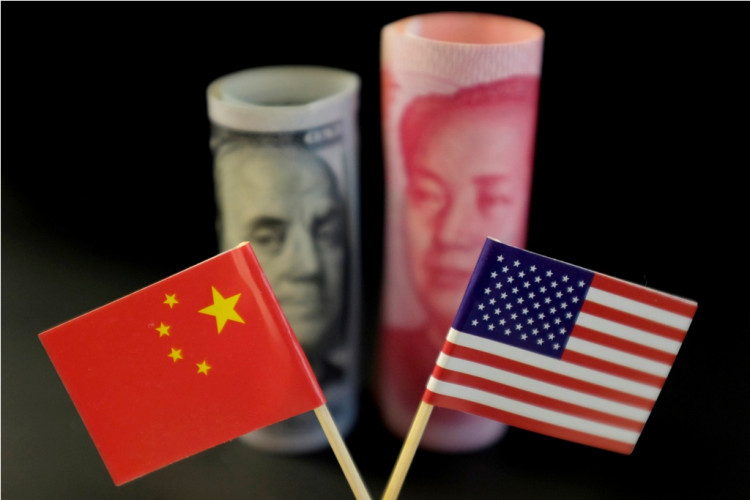China has refused to back down from President Donald Trump's escalating tariff threats, setting the stage for a deepening trade war between the world's two largest economies. Trump's latest move-to impose an additional 50% duty on Chinese imports-would bring the total tariff rate to 104% on many goods if Beijing fails to remove its own retaliatory measures.
The Chinese government responded with unusually forceful language, accusing the United States of "blackmail." In a statement released by the Ministry of Commerce, officials said, "The U.S. side's threat to escalate tariffs against China is a mistake on top of a mistake, once again exposing the American side's blackmailing nature."
"If the U.S. insists on having its way, China will fight to the end," the ministry added, signaling a prolonged standoff.
The conflict intensified after China imposed 34% tariffs in response to an earlier 34% hike from Washington, which had followed a 20% increase earlier this year. Trump's threat to stack an additional 50% on top of that has rattled global markets and drawn warnings from economic analysts about long-term damage.
"If the tariffs keep going up and up, it becomes a battle of wills and principles rather than economics," said Xu Tianchen, senior economist for China at the Economist Intelligence Unit. "Since China already faces a tariff rate in excess of 60%, it doesn't matter if it goes up by 50% or 500%."
Smartphones, computers, toys, lithium-ion batteries, and video game consoles are among the top Chinese exports to the U.S., but tariffs are impacting a broader range of goods-from screws to boilers. Meanwhile, Asian economies like Vietnam and Cambodia also face rising U.S. duties, with new tariffs expected to hit 46% and 49% respectively.
China's response has gone beyond tit-for-tat tariffs. It has allowed the yuan to weaken, making exports more competitive, and encouraged state-owned enterprises to stabilize stock markets through increased equity purchases. The country's central bank has pledged liquidity support, and listed companies have announced share buybacks in an effort to calm investor jitters.
The Chinese people "do not provoke trouble, nor are we afraid of it," said Lin Jian, a spokesperson for China's foreign ministry. "The Chinese people's legitimate right to development must not be deprived."
China's State Council has also engaged with domestic private firms to gather suggestions for weathering the economic pressure. At the same time, export-oriented companies are exploring overseas relocation options to mitigate long-term exposure to U.S. trade policy.
Still, the economic toll may be unavoidable. "The tariffs exacerbate this problem," said Andrew Collier, senior fellow at the Mossavar-Rahmani Center for Business and Government at Harvard Kennedy School. He noted that China's economy is already grappling with a housing market crisis, rising unemployment, and sluggish consumer spending. "[President Xi] faces an increasingly difficult choice due to a slowing economy and dwindling resources," Collier said.
U.S.-China trade tensions are also straining American importers and consumers. In 2024, the U.S. imported $438 billion worth of goods from China while exporting $143 billion-leaving a $295 billion trade deficit, according to the U.S. Trade Representative.
"It would be a mistake to think that China will back off and remove tariffs unilaterally," said Alfredo Montufar-Helu, senior advisor to the China Center at The Conference Board. "Not only would it make China look weak, but it would also give leverage to the U.S. to ask for more."
The interdependency between the two economies further complicates the outlook. "You can only tariff so much for so long," said Deborah Elms, head of trade policy at the Hinrich Foundation.
Elms added that Chinese goods shut out of the U.S. market could flood into Southeast Asia, potentially destabilizing those economies as well. "these places [are dealing] with their own tariffs and having to think about where else can we sell our products?" she said.
Despite Beijing's stated openness to dialogue, President Trump has yet to speak directly with Chinese President Xi Jinping since returning to office. Roland Rajah, lead economist at the Lowy Institute, said, "It's unclear what is motivating these tariffs and it's very hard to predict where things might go from here."
China, Rajah noted, retains a "wide toolkit" for retaliation, including further currency depreciation or regulatory pressure on U.S. firms operating in China. "I think the question is how restrained will they be?" he said. "There's retaliation to save face and there's pulling out the whole arsenal."






